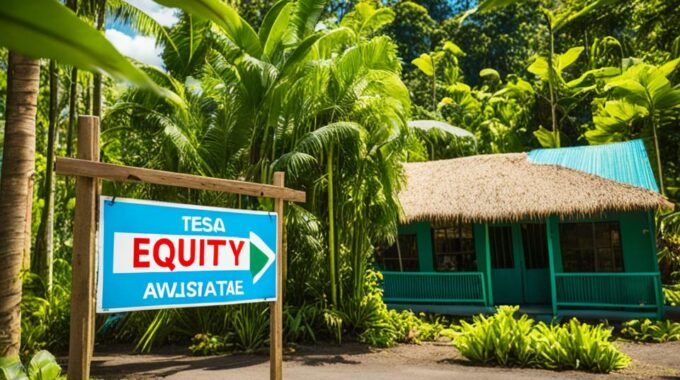Discover expert property investment financing in Costa Rica with GAP Equity Loans. We offer tailored solutions for foreign investors and expats seeking real estate opportunities.

Understanding Refinance Loan Risks with Gap Equity Loans in Costa Rica
When considering a refinance loan with Gap Equity Loans in Costa Rica, it is crucial to understand the potential risks involved. While these loans offer opportunities for accessing funds and maintaining ownership of your property, they also come with certain risks. It is important to be aware of these risks to make informed decisions that align with your financial goals.
One of the primary risks associated with refinance loans is the use of the property as collateral. This means that if you are unable to keep up with the loan payments, you risk losing your home. It is essential to carefully assess your ability to repay the loan and consider potential scenarios that could impact your financial stability.
Another risk to be mindful of is the potential for fluctuations in home values. While the real estate market in Costa Rica may experience appreciation over time, there is also the possibility of a decline in property values. In such cases, borrowers may end up owing more on their loans than their properties are worth. This situation can have long-term financial consequences.
GAP Equity Loans, a reputable provider in Costa Rica, understands these risks and aims to mitigate them. They offer flexible repayment terms that can be tailored to your individual circumstances. Additionally, they provide comprehensive advice and guidance throughout the loan process, ensuring that borrowers make informed decisions that align with their financial needs.
Key Takeaways:
- Refinance loans and Gap Equity Loans in Costa Rica offer access to funds and allow borrowers to retain ownership of their property.
- The primary risk associated with refinance loans is the use of the property as collateral, which puts borrowers at risk of losing their homes if they cannot keep up with payments.
- Fluctuations in home values can result in borrowers owing more on their loans than their properties are worth.
- GAP Equity Loans in Costa Rica aim to mitigate these risks by offering flexible repayment terms and providing comprehensive advice and guidance to borrowers.
- Other alternatives to home equity loans include personal loans, credit cards, and mortgage refinancing, each with its own pros and cons.
Mitigating Risks with Gap Equity Loans in Costa Rica
Gap Equity Loans in Costa Rica prioritize minimizing risks for borrowers through various measures. Understanding the risks associated with refinance loans is crucial for homeowners considering this option. One of the primary risks is using the property as collateral, putting the borrower’s home at stake if they are unable to keep up with payments. Additionally, fluctuations in home values can result in borrowers owing more than their properties are worth. However, Gap Equity Loans offers a solution by providing flexible repayment terms and comprehensive advice and guidance to borrowers.
By using the property as collateral, Gap Equity Loans can offer lower interest rates and more favorable loan terms, making it an attractive option for homeowners. The company takes a personalized approach to ensure that borrowers understand the risks involved and are well-informed about their options. Through their expertise and guidance, borrowers can minimize the risks associated with Gap Equity Loans and make informed decisions.
In addition to Gap Equity Loans, homeowners have alternative loan refinancing options. Personal loans, credit cards, and mortgage refinancing are among the alternatives, each with its own advantages and disadvantages. Gap Equity Loans can provide borrowers with comprehensive advice on these options, helping them evaluate the risks and benefits to make the best choice for their individual circumstances.
Minimizing Risks with Gap Equity Loans
Gap Equity Loans in Costa Rica prioritize minimizing risks for borrowers through various measures. The company offers flexible repayment terms, tailored to the borrower’s financial situation, to ensure that they can comfortably meet their obligations. By working closely with borrowers, Gap Equity Loans aims to prevent situations where homeowners are at risk of losing their properties.
Furthermore, Gap Equity Loans provides comprehensive advice and guidance throughout the loan process. This includes helping borrowers evaluate the risks associated with using their property as collateral, understanding market fluctuations, and making informed decisions about loan refinancing options. By offering this guidance, Gap Equity Loans empowers borrowers to mitigate the risks and secure their financial future.
With Gap Equity Loans, homeowners can confidently explore refinancing options in Costa Rica, knowing that the company prioritizes minimizing risks and offers comprehensive support. By understanding the risks associated with refinance loans and choosing a trusted provider like Gap Equity Loans, borrowers can make informed decisions that align with their financial goals.
Considerations and Alternatives for Refinance Loans in Costa Rica
Before committing to a refinance loan with Gap Equity Loans in Costa Rica, borrowers should carefully consider various factors and explore alternative options. One of the key factors to evaluate is the amount of property equity available. Refinancing a mortgage allows homeowners to tap into their property’s equity, which is the difference between the property’s market value and the outstanding loan balance. The more equity a homeowner has, the more options they have for refinancing.
Mortgage refinancing is a common alternative to gap equity loans in Costa Rica. Refinancing involves replacing an existing mortgage with a new loan that has more favorable terms. This can lower monthly payments, reduce interest rates, or change the loan’s duration. However, it’s crucial for borrowers to carefully review refinance loan terms, such as closing costs and prepayment penalties. Additionally, borrowers should be aware of any potential changes in interest rates, as they can significantly impact the overall cost of the loan.
In the Costa Rican refinance market, borrowers may also consider personal loans or credit cards as alternatives. Personal loans provide borrowers with a lump sum of money that can be used for any purpose. However, interest rates on personal loans tend to be higher than mortgage rates. Credit cards, on the other hand, offer flexibility but can come with high-interest rates and limited borrowing amounts.
GAP Equity Loans, a trusted provider in Costa Rica, offers an alternative option for borrowers seeking to refinance. With flexible repayment terms, GAP Equity Loans aims to provide borrowers with manageable options tailored to their individual financial situations. Their comprehensive advice and guidance can help borrowers navigate the risks associated with refinance loans and make informed decisions. Before committing to a refinance loan, borrowers should carefully consider their specific circumstances, consult with experts, and thoroughly evaluate the risks and benefits of each option available in the Costa Rican market.
Table: Comparison of Refinance Loan Alternatives
| Loan Type | Pros | Cons |
|---|---|---|
| Mortgage Refinancing | Lower monthly payments, potential interest rate reduction | Closing costs, potential prepayment penalties |
| Personal Loans | Lump-sum amount, flexibility in use | Higher interest rates, limited borrowing amounts |
| Credit Cards | Flexibility, availability | High-interest rates, limited borrowing amounts |
Quote: “Understanding the risks and exploring alternative options is crucial for borrowers considering refinance loans in Costa Rica.” – [Your Name]

In summary, when considering refinance loans in Costa Rica, borrowers should carefully evaluate factors such as property equity, mortgage refinancing options, and loan terms. It is essential to understand the risks involved, including the potential use of property as collateral and the impact of fluctuating home values. Consulting with reputable providers like GAP Equity Loans can provide borrowers with the necessary advice and guidance to navigate the refinance market. By considering alternative options and conducting thorough evaluations, borrowers can make informed decisions that align with their financial goals and circumstances.
In conclusion, understanding the risks and considering the alternatives is crucial when exploring refinance loans in Costa Rica, and Gap Equity Loans can provide valuable guidance in this process. Refinance loans and specifically Gap Equity Loans offer borrowers access to funds while allowing them to retain ownership of their property. However, it is important for borrowers to be aware of the risks involved.
The primary risk associated with refinance loans is the use of the property as collateral. If borrowers are unable to keep up with payments, they run the risk of losing their homes. This emphasizes the need for borrowers to carefully assess their financial situation and ability to meet repayment obligations before entering into a refinance loan agreement.
Another risk to consider is the potential for fluctuations in home values. Should the value of the property decrease over time, borrowers may find themselves owing more on their loans than their properties are worth. This is a significant factor to be mindful of, as it can have long-term financial implications.
Fortunately, Gap Equity Loans in Costa Rica aim to mitigate these risks by offering flexible repayment terms and providing comprehensive advice and guidance to borrowers. Their expertise in the Costa Rican refinance market allows them to help borrowers navigate the complexities of refinancing, ensuring that they make informed decisions that align with their individual circumstances.
While Gap Equity Loans are a viable option, it is important for borrowers to explore alternative loan options as well. Personal loans, credit cards, and mortgage refinancing are among the alternatives to consider. Each option has its own pros and cons, and borrowers should carefully evaluate their needs and financial goals before making a decision.
Overall, understanding the risks associated with refinance loans and considering the available alternatives is paramount for borrowers in Costa Rica. By doing so, they can make informed decisions that best align with their financial circumstances and goals, with Gap Equity Loans standing as a trusted partner in providing guidance throughout the process.
FAQ
Q: What are the risks associated with refinance loans and Gap Equity Loans in Costa Rica?
A: The primary risk is the use of the property as collateral, meaning borrowers risk losing their homes if they are unable to keep up with payments. Additionally, fluctuations in home values can result in borrowers owing more than their properties are worth.
Q: How does Gap Equity Loans in Costa Rica aim to mitigate these risks?
A: Gap Equity Loans offers flexible repayment terms and provides comprehensive advice and guidance to borrowers, helping them make informed decisions and minimize the risks associated with refinance loans.
Q: What are the alternatives to home equity loans in Costa Rica?
A: Alternatives include personal loans, credit cards, and mortgage refinancing. Each option has its own pros and cons, so borrowers should carefully consider their specific needs and circumstances before making a decision.
Q: Why is it important to understand the risks and benefits before considering a refinance loan?
A: Understanding the risks associated with refinance loans is crucial to avoid potential financial pitfalls. It allows borrowers to make informed decisions and choose the option that best suits their needs and financial situation.
Article by Glenn Tellier (Founder of CRIE and Grupo Gap)



